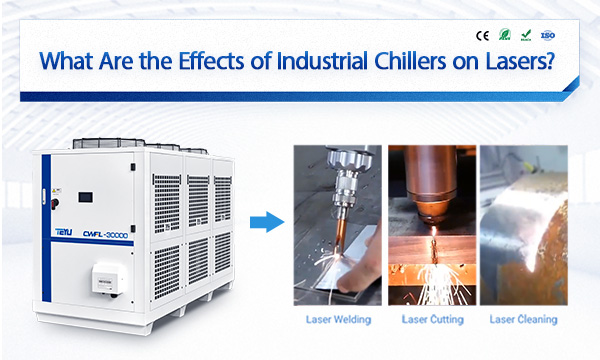Tanpa chillers industri kanggo mbusak panas ing mesin laser, mesin laser ora bisa dienggo kanthi bener. Dampak saka chillers industri ing peralatan laser utamané klempakan ing rong aspèk: aliran banyu lan meksa saka chiller industri; stabilitas suhu saka chiller industri. TEYU S&A pabrikan chiller industri wis spesialisasine ing kulkasan kanggo peralatan laser kanggo 21 taun.
Apa Efek saka Chillers Industri ing Mesin Laser?
Dibandhingake karo peralatan laser sing larang (utamane pemotong laser serat sing regane atusan ewu utawa malah mayuta-yuta dolar), peralatan cooling laser relatif murah, nanging isih penting. Tanpa piranti cooling kanggo mbusak panas ing mesin laser, mesin laser ora bisa dienggo kanthi bener. Ayo goleki pengaruh mesin pendingin industri ing peralatan laser.
Aliran Banyu lan Tekanan saka Chiller Industri
Mesin laser minangka piranti presisi sing kasusun saka akeh komponen sing ora bisa nahan pasukan eksternal, yen ora, bakal rusak. Banyu cooling langsung mengaruhi mesin laser, njabut panas lan banjur mili bali menyang tank banyu piranti cooling kanggo cooling. Proses iki penting kanggo cooling peralatan. Mulane, stabilitas aliran banyu cooling lan tekanan iku kritis.
Yen aliran banyu ora stabil, bakal ngasilake gelembung. Ing tangan siji, umpluk ora bisa nyerep panas, nyebabake panyerepan panas sing ora rata, nyebabake panyebaran panas sing ora wajar kanggo peralatan kasebut. Akibaté, peralatan laser bisa nglumpukake panas lan malfunction. Ing tangan liyane, umpluk kedher nalika padha mili liwat pipo, kang exerts pasukan impact abot ing komponen tliti mesin laser. Sajrone wektu, iki bakal nyebabake kegagalan mesin laser, nyepetake umur laser.
Stabilitas Suhu saka Chiller Industri
Kanggo mesthekake operasi normal peralatan laser, kondisi suhu tartamtu kudu ketemu. Njupuk mesin nglereni laser serat minangka conto, sirkuit cooling optik kanggo host laser suhu kurang, nalika sirkuit cooling laser kanggo sirah nglereni QBH suhu dhuwur (relatif kanggo suhu kurang kasebut sadurungé). Mulane, chillers laser karo stabilitas suhu dhuwur luwih kondusif kanggo output laser. Padha nyuda konsumsi energi lan impact panas nalika nambah efficiency produksi.
TEYU S&A Produsèn chiller industri wis spesialisasine ing kulkasan kanggo peralatan laser kanggo 21 taun. Liwat taun riset lan inovasi, TEYU S&A laser chillers wis mboko sithik dadi peralatan cooling standar. Desain pipa cooling sing inovatif, digabungake karo komponen inti kayata kompresor lan pompa banyu sing apik banget, wis ningkatake stabilitas banyu sing adhem. Kajaba iku, stabilitas suhu paling dhuwur wis tekan ± 0.1 ℃, ngisi celah ing peralatan chiller laser kanthi tliti dhuwur ing pasar. Akibaté, TEYU S&A volume dodolan taunan perusahaan ngluwihi 120.000 unit , entuk kapercayan saka ewu manufaktur laser. "TEYU" lan "S&A" chillers industri kondhang ing industri manufaktur laser.

We are kene kanggo sampeyan nalika sampeyan mbutuhake kita.
Mangga ngrampungake formulir kanggo ngubungi kita, lan kita bakal seneng mbantu sampeyan.










































































































